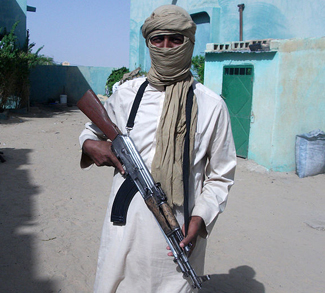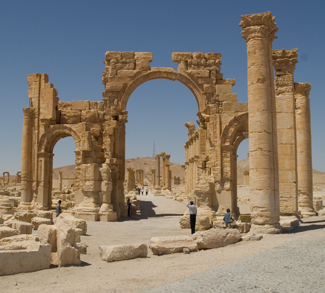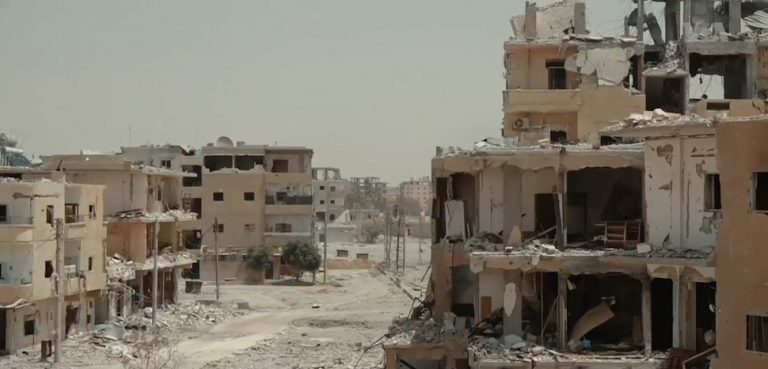This article is a summary of views from a recent international conference in Bucharest.
Terrorism and risks across the MENA region were the main topics of discussion at “Evolutions in Fighting Terrorism and New Challenges in the Middle East,” an international conference that took place at the beginning of July in Bucharest. For the third time, Liviu Muresan, president of EURISC (European Institute for Risk, Security and Communication Management), and Flavius Caba-Maria, president of MEPEI (Middle East Political and Economic Institute), assembled a valuable pool of international experts on terrorism and the Middle East. They spoke on various challenges across the MENA region, and touched down on a few possible solutions for this turbulent region.
The statements made during this conference should be interpreted with critical thinking and put in the larger context. It was obvious that the speakers expressed opinions without reserves, but a degree of diplomacy could be perceived in their artful discourse.
One major question remains: “Who is funding Daesh and who is giving them such sophisticated weapons?”
Mostafa Zahrani, adviser of the Iranian Minister of the Foreign Affairs, painted an intricate picture of the MENA region: “a mixture of failed and authoritarian countries, non-governmental entities trying to gain influence, groups that want to return to power…. the Houthis in Yemen and the Kurds and Daesh… Many problems in our region come from Iraq, so we all must fight for the peace, stability, and territoriality of Iraq. We have an antithetical paradigm in our region: Islamist versus non-Islamist, Sunni versus Shia… and this is not the proper answer for what we are confronting in the region. We need a new paradigm.”
Zahrani also pointed out some matters to be taken into consideration when we think of solutions: “Russia is trying to gain a role on the global stage through its military power. The instability in Iraq and Syria is an indirect result of the rivalry between some countries within the region, and some countries outside…. Some countries actually want to create rivalry between other countries, for instance between Iran and Russia, to have an instrument for their actions. But it is more important to have a political solution and not to wait for Daesh to take power in Syria.”
Zahrani invited the audience to think of “Iran as a stabilizing force” because Iran already proved its capacity “to fight terrorism and paid its price in victims.” He concluded that: “Daesh is actually gone from many places.”
China’s OBOR initiative is also seen by Iran as constructive and “we should all have projects built around this idea.”
Zahrani reminded that “the new American president is very much inexperienced and immature, especially when it comes to our region. No clear strategies for our region, for Syria for instance….. Compared to the election campaign, today we see a different point of view. Then, we have another immature and inexperienced young leader in Saudi Arabia, who has just taken over the power… And some immature thing also took place in the Emirates.”
Speaking on the United States: “Unfortunately, due to American domestic politics and due to the personal characteristics of Mr Trump, the Joint Comprehensive Plan of Action (JCPOA), the agreement between the P5+1+EU and Iran, is not very constructive, and it can be even destroyed… Pushing back Iran is a policy that is being taught in Washington when they speak of Iraq, Syria, Yemen… However, Iranians perceive Europe to be positive and Europe’s role may be to educate immature leaders in the MENA region and in Washington,” concluded Zahrani.
Some conference participants emphasized that, while the EU did not put conflict resolution in the Syrian civil war as a top priority, Russia, Iran, Saudi Arabia, and Turkey increased their influence in the region. On the other hand, the EU is struggling with the millions of migrants and, although it clearly sees the connection between these conflicts and migration, it is not able to help find an end to the conflict in the Middle East.
Nasser Hadian Jazy, professor of political sciences with the University of Tehran, stressed the entangled situation in the MENA region: “Libya is gone, Syria is gone, and Egypt is dysfunctional. Saudi Arabia is waging war and holds Iran as enemy, Daesh and Al-Nusra and other terrorist factions are active, and no one is talking about Palestinian rights and settlements…So, even in Israel’s dreams, it could not have been a better plan.”
Speaking of Libya, Nicola Pedde, Director of the Institute for Global Studies in Rome, believes that: “After 6 years, the dynamics of the Libyan crisis is controversial. Domestic problems were used by foreign forces to cause the collapse of the Gadhafi regime. When the first protests appeared in 2011, there was obvious interest in Qatar and some European countries, though supposed friends of Gadhafi, to support these movements… Italy is one example; although it was a friend of Gadhafi, it supported his toppling… which is quite controversial.”
Pedde provided a short chronological depiction of the events, underlining the intricate chain of actors that played roles without bringing about a new, stable regime: “After the toppling of Gadhafi, the disaster came, and forced those who got involved to request NATO intervention in order to prevent Gadhafi’s forces from regaining certain areas… The aftermath was total chaos and a lack of national identity. Militias and political groups didn’t unite in a strong political capacity, and this led to a third phase, supported by Qatar and other countries, which caused the appearance of the Muslim Brotherhood, which in turn triggered the involvement of other countries such as the UAE, wanting to chase Qatar’s interests and support secular forces in Benghazi. Basically, there was a clash between Islamist forces and secular forces, between Tripoli and Benghazi.”
Pedde explained: “Local and European narratives do not coincide on this issue, because we cannot simply say Islamist is bad and secular is good! The narrative on the ground is different; the clash is between those who toppled Gadhafi but wanted to set up a new authoritarian regime in Tripoli, and those who wanted to set up a new government in the East. The situation is very complex in Libya, with local intricacies and very strong foreign elements interfering. Italy, for instance, always sponsored Libya in an attempt to foster reconciliation among all parties, because Italy has interest in Libya. However, reconciliation is not likely any time soon, unfortunately, because, despite the fact that the government in Tripoli is officially recognized, a lot of important actors still support the government in the East.”
Regarding the threat posed by terrorism in and around Libya, Pedde believes that “it has been an exaggeration. The real numbers of Daesh or Daesh-affiliated elements are lower than presented by Western actors that have an interest in presenting Libya on the brink of collapse. The aftermath of the battle in Sirte proved that the numbers were wrong, and the evolution of events showed that Daesh is rather chaotic and heterogeneous in Libya. It is a threat, but other threats are more dangerous, such as organized crime.” Interestingly, Pedde thinks “we cannot expect terrorist threats to come through the migrant inflow into Europe. Most threats in Europe relate to groups who are already in Europe.”
Related to the migrant flows, Pedde believes that all criticism directed to Europe, claiming it cannot handle this issue, is not justified. He suggests, like many other international experts, that the root causes should be addressed, because “by accepting the migrants, we are simply moving the problem onto the other shore. The Western world has failed to provide a concrete solution in the region. We promised security but we failed to provide capacities for economic growth, so what we can expect in the next decade is a continuous inflow of migrants and a humanitarian threat.”
Badra Gaaloul, president of the International Centre for Strategic Security and Military Studies in Tunis, believes that it’s strange that the revolutionary Arab countries are now struggling with terrorism and turmoil, and do not enjoy democracy as they initially wanted,. Badra speculates that the cause may be “because we don’t have significant actors in our Arab world.” Another reason may be the two perceived pillars of power in today’s world: “on the one hand, the Western pillar, where we have a conflict of interests between Europe and the U.S., and on the other hand, an emerging pillar in Russia-China-Iran…We realize that it’s not easy for the U.S. to leave the Middle East under the influence of the second pillar, and it’s not easy for France to leave Northern Africa, its former colonies…” The question of “Why did the revolutions fail in Arab countries?” may have the following answer: “They were not genuine revolutions; an external actor played a role in these revolutions.”
Just like Nicola Pedde, Ms Gaaloul admitted that “Libya is a complicated case and we are not sure whether we speak in a very informed way about Libya, because of the global stakeholders and foreign interests involved. Italy, for instance, takes advantage of Libyan petroleum, France and Spain also see interests there… because Africa, in general, is very rich in resources.”
Regarding terrorism, Ms Gaaloul claims that “in Libya we don’t speak of Daesh, but Al Qaeda! Many people say Daesh is fading and Al Qaeda is reviving. A return of Daesh is taking place toward Al Qaeda in Northern Africa. According to information we possess, Daesh terrorists from the Middle East returned to Libya on Libyan planes and they joined Al Qaeda. In 2015, people were mentioning thousands of Daesh terrorists in Sirte, but it turned out not to be true, and those who came are now integrated into branches of Al Qaeda.”
However, one major question remains: “Who is funding Daesh and who is giving them such sophisticated weapons?”
Another aspect of today’s geopolitics is the lack of trust in the discourse of international leaders, and the difficulty in creating new alliances, because “look at Trump – he lies 3-4 times a day and, each time, he comes up with another version.”
Abdul Halim Fadlallah, chairman of the Consultative Centre for Studies and Documentation in Beirut, gave an overview on the evolution of terrorism. First, “there have been three waves of terrorism and each of them was supported by the U.S. and some Western countries.” Terrorist groups started either as “conservative or resistance groups, such as Hezbollah and Al Qaeda.” Second, “the terrorist discourse shifted from the entire society toward elements at the margins of society.” Thirdly, “ideology has shifted from a very strong focus on religion toward minimal [religious content], with racist, extremist, and radicalized tinges.” Fadlallah explained that in Lebanon, the strategy to fight terrorism included political and cultural elements, and only in case of failure, a military solution.
An interesting aspect was raised by Mohammad Irani, director general for the MENA department with the Iranian MoFA, who said: “It’s not clear under what authority the bombings in Syria are taking place.” And he clearly stated that Iran has come to the conclusion that “a military solution does not work in Syria” but only “trust-building between the government and the opposition.”
A positive outcome of the Astana talks was suggested by Leonid Gusev from the Moscow State Institute of International Relations of the Russian MoFA. He declared: “The Syrian government initiated political dialogue with parts of the opposition, and this is already very good especially because they want to continue. Negotiations are not so much about Syria but more about the future configuration of the Middle East as a whole because it accommodates significant resources of oil and gas.”
A brief clarification on the apparition of terrorism was given by Alain Corvez, former international relations adviser to the French Minister of Foreign Affairs. He sees that roots of conflict in the Middle East as the creation of the Israeli state in 1947. General De Gaulle’s opinion in 1967 was that “it was disturbing to create Israel in the middle of Arab states, and the first one who attacks will be wrong.” Since Israel attacked and occupied territories, it saw an opposition that, Corvez explains, was called terrorism.
Regarding Syria and the Middle East, Corvez believes that Europe, and France in particular, had very feeble strategies and no foreign policy. When the first attempts occurred in France, Corvez asked for strong cooperation between the French and Syrian intelligence services. He expects Macron to be more constructive on the Syrian issue because Macron had already made a short statement according to which “we need an approach with Russia on the Syrian issue, but I do not see a replacement for al-Assad at this moment.” However, Corvez is worried about a later statement in which Macron said: “I agreed with President Trump that, in case Syria makes use of chemical weapons, we shall attack Syria.”
Bucharest’s third conference on terrorism and the MENA region is becoming an institution. Aware that a future threatened by terrorism and too much animosity among significant global stakeholders can only damage international relations, the two think-tanks, EURISC and MEPEI, subtly suggest that the equation should be no longer antithetical but complementary and they expressed several times their openness to provide their locations in Bucharest and their expertise as mediators for the dialogue between the stakeholders in the MENA region that cannot reach a mutual understanding.
The opinions, beliefs, and viewpoints expressed by the authors are theirs alone and don’t reflect any official position of Geopoliticalmonitor.com.




